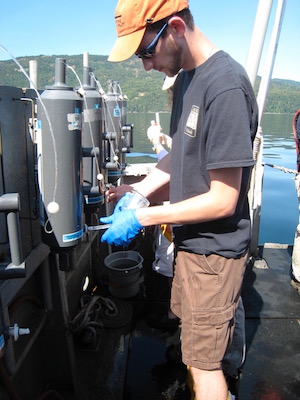Ocean Sciences Courses
The School of Earth and Ocean Sciences offers a variety of ocean sciences and related courses from introductory 100-level courses to our set of core 300-level and advanced 400-level courses.
EOS 110: Oceans and Atmosphere
This introductory class delves into the ocean-atmosphere system, examining different aspects of its biology, chemistry, geology, and physics. It is open to any student at the university and includes a lab component that goes into greater depth on each topic.
EOS 311: Biological Oceanography (also: BIOL 311)
An introduction to the ways in which physical, chemical and biological processes interact to regulate structure and productivity of marine ecosystems. Lectures will focus primarily on planktonic ecosystems. Participation in a one-day oceanographic cruises is required. This course is required in the Minor in Ocean Sciences and is an option in the combined Chemistry or Physics programs.
EOS 312: Introductory Chemical Oceanography
This class focuses on how oceanographers use observations of chemicals in the ocean to understand how the ocean functions, including the operation of biological, physical, chemical, and geological processes. The ocean’s carbon cycle and its control on climate is a primary theme. The class involves participation in a 1-day oceanographic cruise and laboratory analysis of samples collected. This course is required in the Minor in Ocean Sciences and the combined Chemistry program and is an option in the combined Physics program.
EOS 313: Introductory Geological Oceanography
An introduction to the geological processes that shape the ocean basins, oceanic plate creation and structure, hydrothermal circulation at mid-ocean ridges, bathymetry, ocean islands, different types of ocean margins, ocean sediments, the sedimentary record of past ocean circulation, coastal geology. The class involves participation in a 1-day oceanographic cruise and laboratory work. This course is required in the Minor in Ocean Sciences and is an option in the combined Chemistry or Physics programs.
EOS 314: Descriptive Physical Oceanography
An introduction to the geography of Earth's fluid ocean and the physics that governs it. Topics include fundamental physical variables and their distribution, air/sea interaction, water masses and their formation, large-scale ocean dynamics, equatorial and coastal physical oceanography, and interactions between physical, chemical, and biological processes in the ocean. The class involves participation in a one day oceanographic cruise and a laboratory component focused on data analysis. This course is required in the Minor in Ocean Sciences and the combined Chemistry program.
EOS 350: Understanding the Oceans
The class focuses on a small set of topics involving human impacts on the ocean and the relationship between the ocean and our society. It is open to any student at the university with at least second year standing.
EOS 431: Physical Oceanography (also: PHYS 441)
Observations and theories explaining the wind- and buoyancy-driven circulations of the ocean. Topics include: wind-forced currents; ocean-scale gyres; coastal circulation; conservation of dynamical tracers; mixing, potential energy and the resulting basin-scale overturning circulations; waves.This course is required in the combined Physics and Ocean-Atmosphere Sciences program.
Other UVic courses with a marine component:
- EOS 403 Global Biogeochemical Cycles
- EOS 410 Global Tectonics
- EOS 425 Aqueous Chemistry in the Earth and Ocean
- EOS 431 Physical Oceanography
- EOS 433 The Climate System
- BIOL 319 Marine Ecology
- BIOL 322 Biology of Marine Invertebrates
- BIOL 335 Ichthyology
- BIOL 446 Advanced Aquatic Ecology
- PHYS 426 Fluid Mechanics
- EOS 490 or BIOL 490D are Directed Studies classes that may be used toward our ocean sciences programs provided that an appropriate oceans-related topic is chosen (with permission of department).
- MRNE courses are offered through the Bamfield Marine Sciences Centre and may be used to fulfill some requirements of our ocean sciences programs provided an appropriate oceans-related topic is chosen and with permission of department.
